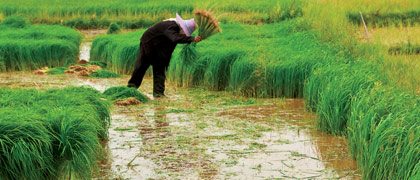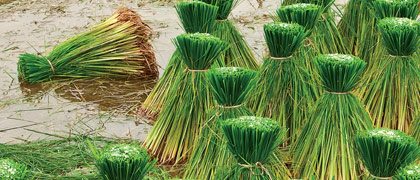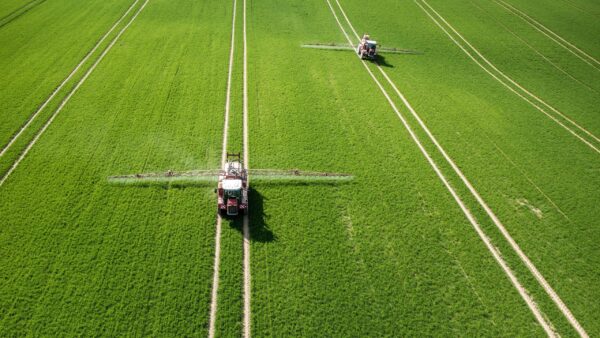An in-depth overview of the global seed industry. From developing the seed sector in China to UPOV accession in Africa, seed issues take center stage around the world.
STATUS AFRICA
The African Intellectual Property Organization (OAPI) became the second inter-governmental organization and the 72nd member to join the International Union for the Protection of New Varieties of Plants (UPOV) when OAPI director general, deposited the instrument of accession June 10, 2014, to the UPOV Convention and Secretary-General Francis Gurry.
UPOV provides an effective system of plant variety protection, with the aim of encouraging the development of new varieties of plants, for the benefit of society.
OAPI operates a plant variety protection system, which covers the territory of its 17 member states: Benin, Burkina Faso, Cameroon, Central African Republic, Chad, Comoros, Congo, Côte d’Ivoire, Equatorial Guinea, Gabon, Guinea, Guinea-Bissau, Mali, Mauritania, Niger, Senegal and Togo. OAPI headquarters are in Yaoundé, Cameroon.
“The accession of OAPI is a milestone in the history of UPOV and promises to help strengthen the system of plant variety protection around the world,” Gurry says.
STATUS China
Beijing is planning to build a national seed Silicon Valley in its Tongzhou District, with the aim of fueling the development of the seed industry in both the city and China at large, said Wu Baoxin, director of the Beijing Municipal Bureau of Agriculture, during the International Seed Federation’s 2014 World Seed Congress.
“Advantageous resources will be clustered in the high-tech area to boost the development of a modern agriculture and a modern seed industry for both city and country,” Wu said. “Beijing has brought a development plan for its seed industry into full swing. Between 2010 and 2015, an action plan has already been implemented to turn the city into a center for seed and technology innovation for China’s seed industry, as well as trade and exchange in the global seed industry.”
To build the city into the “capital of seed breeding,” special funds worth more than 300 million yuan (US$48.4 million) have been allocated during this period.
Moving forward, research and development efforts will focus on 16 advantageous species or varieties in the four major fields.
“Beijing leads the country in seed breeding research and development,” Wu said. “Every year, the city cultivates more than 400 new varieties of grain and vegetables and the new varieties of major crops account for about 10 per cent of the national total.”
Three of China’s top 10 seed companies are based in Beijing. According to Wu, eight of the world’s top 10 seed companies, including Pioneer and Monsanto, have set up research and development centers or branches in the city.
He noted that Beijing has become China’s largest seed trade center. In 2012, Beijing’s seed industry sales exceeded 10 billion yuan (US$1.61 billion), accounting for about 10 per cent of the national total. The city’s crop seed import and export volume comprises 37 per cent of China’s total.
STATUS Pakistan
“The Unavailability of quality seed greatly hinders agricultural productivity,” said University of Agriculture Faisalabad vice-chancellor Iqrar Ahmad Khan June 12.
He was addressing a workshop on capacity building in seed technology organized. Khan said Pakistan was importing hybrid seeds of maize, rice and potatoes worth billions of rupees. This amount could be saved by strengthening the seed industry and farmers’ cooperatives, Khan said, explaining the use of certified seeds was only 20 per cent and that most farmers depend on uncertified seed.
In 2012, seed demand for various crops was 1.5 million tons but Khan said farmers were short 1.14 million tons. The lack of quality seed, machinery and horse power in Pakistan greatly hampers improvement in agricultural production, he said, noting that the UAF set up a center for research in seed quality. He said the university would soon launch a degree in seed sciences.
Federal Seed Certification and Registration director general, Shakeel Ahmad Khan, said the Pakistan Seed Academy would strengthen public-private partnerships in seed innovation.
Nominated as president of the forum, Khan said the academy would develop human resources in seed technology, bringing together stakeholders from national and multinational seed companies, public seed sectors and farmers associations so that their problems can be solved through collaboration.
Faculty of Agriculture dean Muhammad Arsahd called for action to ensure the availability of quality seed so that agricultural productivity could be improved. He said that for sustainable agricultural growth and food security, quality seed should be a top priority.
Punjab Seed Corporation managing director Khaqan Babar said the corporation was committed to supplying high-quality seeds at affordable prices to farmers.
Crop Physiology Department chairman Shahzad Basra said with the rapid growth of the private seed sector, the number of companies had reached 766.
He said lack of trained manpower in the seed industry was also a hurdle to increased productivity. UAF is making an all-out effort to provide the trained manpower in this regard, Basra said.
Seed Association of Pakistan chairman Salman Mahmood Khan stressed the role of national seed companies in Pakistan.
The Pakistan Seed Academy is an initiative of the University of Agriculture Faisalabad and Federal Seed Certification and Registration Department, joined by Punjab Seed Corporation, Seed Association of Pakistan, Crop Life Pakistan and Farmers Association of Pakistan.
STATUS Thailand
The shortage of high-quality rice seed is one of the major problems faced by farmers in Thailand, as it affects the production and quality of rice grains entering the market.
Of the demand for rice seed, only 40 per cent is met, which leads to production problems such as low yield and inconsistent and low-quality rice grains.
Rice seed growers have trouble accessing elite lines and master seeds. There’s a lack of seed-production knowledge among farmers and a shortage of inspectors to certify high-quality seed. Additionally, a disconnect between producers and distributors exists. Couple those items with a weak financial structure to support production and distribution and the problems add up.
To help tackle these issues, six organizations have teamed up to promote the production of high-quality rice seeds. The collaborating agencies include:
• Rice Department
• The Bank for Agriculture and Agricultural Cooperatives
• The Thai Rice Foundation under Royal Patronage
• The National Science Technology and Innovation Policy Office
• The Agricultural Research Development Agency
• The National Science and Technology Development Agency (NSTDA).
The six organizations will work together to address these problems based their strengths and expertise that each body brings to the table.
Our objective is to develop the network of rice-seed producers and distributors; upgrade the production and certification systems for high-quality seed; and better meet the demand for rice seed, says Thaweesak Koanantakool, NSTDA president.
Activities to be undertaken will include launching a seed production training program and boosting human capital in the field of seed certification; increasing awareness among farmers about the importance of quality seed; and improving access to financial resources for farmers and business operators in the value chain.
With this collaboration, rice production in Thailand can advance and generate significant income for farmers, as well as increase the competitiveness of the rice industry in the global market, Koanantakool says.

















